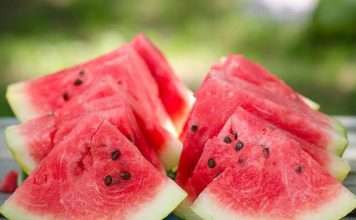Did you know that watermelon seeds, often discarded without a second thought, are not only safe for consumption but also contain a wealth of essential nutrients that can greatly benefit your overall health and well-being?
Contrary to common belief, these small seeds, whether they are black or white, are completely harmless when ingested. White seeds from seedless watermelons are simply empty seed coats and pose no threat when consumed. On the other hand, the black seeds typically found in regular watermelons are mature and safe to eat, as they pass through the body as insoluble fiber.
Let’s explore in greater detail why it is safe and beneficial to consume watermelon seeds:
1. Watermelon seeds are a true nutritional powerhouse, containing an array of essential nutrients such as protein, healthy fats, vitamins, and minerals. They are rich in crucial amino acids like lysine and tryptophan, which are vital for growth and repair.
2. These seeds are also a good source of healthy fats, including monounsaturated and polyunsaturated fats, which are known to be beneficial for heart health. Consuming them as part of a balanced diet can help lower cholesterol levels.
3. Watermelon seeds are chock-full of essential vitamins and minerals like magnesium, iron, zinc, and potassium. Magnesium plays a key role in muscle function and energy production, while iron is essential for oxygen transport in the blood. Zinc supports immune function, and potassium helps regulate blood pressure.
4. Watermelon seeds are a great source of dietary fiber, aiding in digestion and helping to prevent constipation. A diet high in fiber can also promote satiety, keeping you feeling fuller for longer and potentially assisting with weight management.
5. Watermelon seeds boast antioxidant properties, containing compounds like lycopene that give the fruit its vibrant red hue. These antioxidants help protect cells from damage caused by free radicals, reducing the risk of chronic diseases like heart disease and certain cancers.
6. By incorporating watermelon seeds into your diet, you can contribute to your overall health and well-being. Whether consumed raw, roasted, or ground into a powder, these seeds can provide a nutritious boost to your meals and snacks.
While watermelon seeds are generally safe for consumption, it is important to enjoy them in moderation, as excessive intake may lead to digestive discomfort due to their high fiber content. Individuals with seed allergies should exercise caution or seek guidance from a healthcare professional before including them in their diet.
In conclusion, watermelon seeds are not only safe but also offer a myriad of health benefits. Instead of discarding them, consider keeping and incorporating watermelon seeds into your diet for a nutritional boost that can help you thrive and lead a healthier lifestyle.
